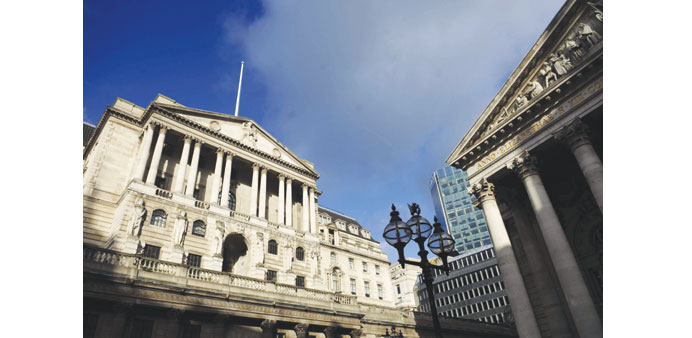Carney to stay coy on whether rates will rise this year; economists see no change to BoE’s GDP or inflation forecast; wage growth likely to be revised down for 2014 and 2015; first move to hinge on data, no detailed guidance offered
|
|
A year after the Bank of England launched forward guidance on monetary policy, Governor Mark Carney faces the opposite challenge next week — to say as little as possible about exactly when interest rates will start rising.
Carney is due to present the British central bank’s updated economic forecasts at 0930 GMT tomorrow.
This time last year, the BoE committed to keep interest rates on hold for the foreseeable future. But a more robust recovery than expected — and in particular a sharp drop in unemployment — now means a rate rise is on the cards for either late this year or early 2015.
This would make it the world’s first major central bank to raise rates since the end of the financial crisis, despite Britain taking longer than most countries to return to its previous level of output.
Carney is unlikely to want to say much more on the exact timing of a rate rise. Instead, he is likely to emphasise his longer-term message that borrowing costs will increase gradually and peak at a level well below the pre-crisis norm.
“We expect some ambiguity about whether it is the fourth quarter or the first quarter next year. It makes sense for them to keep their options open,” said Melanie Baker, a UK economist at Morgan Stanley.
While Carney surprised markets in June by saying they had underestimated the chance of a rate rise this year, more recently — with expectations for a November move hovering at 50% — he has described the timing as “data dependent”.
Britain’s economy has continued to perform strongly over the past three months, with only tentative signs of the slight second-half slowdown the BoE forecast in May, despite a darker overseas outlook with greater tension in Iraq and Ukraine.
And although soaring house prices — especially in London — have driven some speculation about a rate rise, the BoE has insisted other tools such as curbs on lending are the first line of defence against an overheated housing market.
Most economists polled by Reuters this week did not expect any major change to the BoE’s forecast for growth and inflation over the next two to three years.
These predict gross domestic product growth of 3.4% this year and 2.9% in 2015 — well above Britain’s long-run average — and inflation to stay below its 2% target.
The one dark spot is wages, which have failed to pick up as the BoE forecast. Here economists expect the BoE to revise its 2014 and 2015 wage growth forecasts down to 1.4% and 2.9% respectively, from 2.5% and 3.5%.
How much the BoE revises down its wage forecasts may offer some clue to how soon it thinks rates need to rise.
Weak wage growth is the most compelling evidence that Britain’s economy is still operating well below its full capacity, and that inflation is no danger despite strong growth and a record number of people in work.
It feeds into a broader measure of economic slack which the BoE estimated was equivalent to 1.0-1.5% of GDP in February and May.
The BoE has said it intends to raise rates before slack hits zero, and incoming deputy governor Minouche Shafik said last month that she expected it to be revised lower.
Many economists polled by Reuters see a 0.75-1.25% range as possible, though some think the measure is too vague to offer useful signals about the BoE’s policy intentions.
Instead - after a year of more or less clear guidance on rates from the BoE — economists expect to return to looking at data and reading between the lines of policy statements.
“You will have to take it from the tone of the delivery. We don’t have a formal measure now from which you can deduce when they can raise rates,” said Brian Hilliard of Societe Generale.

